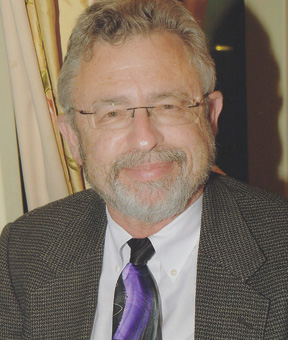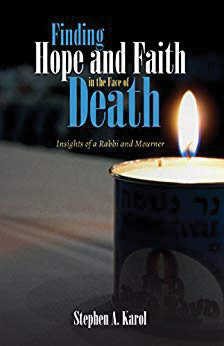
Rabbi Stephen Karol will visit the Kansas City area Friday, March 8, through Sunday, March 10, to talk about his book “Finding Hope and Faith in the Face of Death: Insights of a Rabbi and Mourner” (published by Cascade Books, April 2018) and other topics at several locations.
“Usually I share the (book’s) introduction with people because it reflects the whole book,” he said. “Then I read a different chapter at each speaking engagement. Usually when I’m done, (he and his audience) have a discussion. I’ve found that people just want to talk about death — preparations for it, reactions to it.”

Rabbi Karol will speak March 8 at services for The Temple, Congregation B’nai Jehudah to be held at Jewish Community Campus. He will lead the Sichat Shabbat (Shabbat study) the morning of March 9 at Congregation Beth Torah; he titled his talk “A King-Sized Scandal: The Story of David and Bath Sheba.” And he will teach two classes related to his book on the morning of March 10 at United Methodist Church of the Resurrection in Leawood.
Sales of the book have been going well, Rabbi Karol said. The more people have heard about it or gotten recommendations from others, the more sales have increased. He gave a speech on the book in early January at a synagogue on Long Island, New York, and was also invited to speak there on three different topics.
Rabbi Karol was born and raised in Kansas City, Missouri. He became a Bar Mitzvah at The Temple, Congregation B’nai Jehudah. He lives in Port Jefferson, New York, with his wife, Donna.
His parents, Ruth and Joe, were very involved at B’nai Jehudah, especially in Sisterhood and Brotherhood. His first cousins Barbara Katz, Patsy Shanberg, Bill Shapiro, Michael Azorsky and Eileen Goldman, and many second cousins, all live in the Kansas City area.
Rabbi Karol retired from the pulpit about four and a half years ago. He is rabbi emeritus of Temple Isaiah in Stony Brook, New York. He also served as rabbi at Temple Beth Zion in Buffalo, New York, and Congregation Sha’aray Shalom in Hingham. He teaches at Temple Isaiah and the Osher Lifelong Learning Institute at Stony Brook University.
He was ordained at the Hebrew Union College in Cincinnati, Ohio, in 1977. He received a bachelor’s degree in sociology with a minor in Hebrew studies from the University of Wisconsin.
He first decided he wanted to become a rabbi when he was a teenager, and he has been staying busy in retirement. In addition to having written his book, he teaches two classes at Temple Isaiah, one a Bible study on Sundays and one on various topics on a weeknight. And he speaks at various other synagogues in the New York City area and is trying to schedule some speaking engagements in the Boston area.
It came about that Rabbi Karol’s various connections led him to arrange his speaking engagements in Kansas City in March. He met Rabbi Mark Levin, Beth Torah’s founding rabbi, at Jewish summer camp in 1966, and they were in rabbinical school together. He met Rabbi Javier Cattapan, Beth Torah’s spiritual leader, last year and told him about his book. Rabbi Cattapan referred Rabbi Karol to Rabbi Monica Kleinman, Beth Torah’s director of lifelong learning.
Rabb Karol’s cousin, Bill Shapiro, bakes challah for Beth Shalom and has done so for B’nai Jehudah. Another cousin, Michael Azorsky, is past president of Beth Shalom. Rabbi Karol was in Kansas City recently for his the 50th reunion of his Center High School graduating class. His closest friend in high school told him about United Methodist Church of the Resurrection and invited him to come.
Despite his full life, Rabbi Karol wrote in his book about his fear of death. Uncertainty is at the root of his fear, and he carries both despite his faith that life in some form awaits us all after death. In counseling his congregants over the years, he learned that many of them shared his fear and uncertainty.
“I can tell you exactly when my uncertainty started,” he wrote in the book’s introduction. “We were living in Hingham, Massachusetts, and I was serving my second congregation of the three that I served over a period of 37 years. Our daughter Samantha had just been born, and her bedroom was across the hall from our bedroom. She would occasionally sing herself to sleep; that’s what her mother and I called it. She would hum and sound perfectly happy as she drifted off to sleep with a cassette tape of pleasant music playing in the background.
“Most of the time, I was amazed at how fortunate I was and we were,” he writes. “All of a sudden one night, I sat up in bed and began to think about what it would be like to not have this kind of happiness, and — even worse — to not be alive! What would it be like? And how would I know?”
Rabbi Karol said in an interview with The Kansas City Jewish Chronicle that, in a sense, he’d spent all his 37 years as a rabbi writing the book. He devoted his time to people during his career and felt he didn’t have time to write a book.
“The subject, I think, is important,” he said. “During my life and career, I know that people have a hard time dealing with death.”


